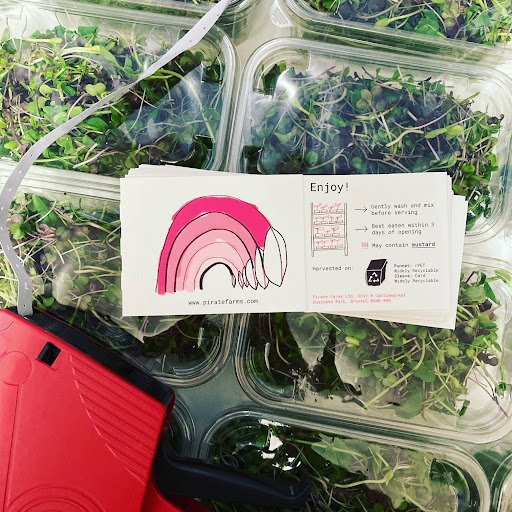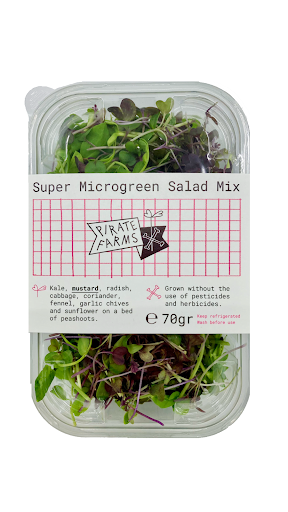Confessions of a container farmer: a conversation with Oscar Davidson
Confessions of a container farmer: a conversation with Oscar Davidson
Oscar is LettUs Grow’s Business Development Specialist. He has experience in vertical farming as a grower, in operations, and running his own small urban farm. Oscar has worked for pioneering indoor farming companies and projects over the years, working in both the commercial and community engagement sectors.
Hey Oscar! You’ve worked in lots of different farms, from container farms to vertical farms in warehouses. What was your experience of the different systems?
The very first farm I worked in was an aquaponic container farm back in 2013. We had tilapia fish in a tank housed in the container, with the plants in a greenhouse on top. This was a proof of concept project aimed at engaging the public, potential customers and investors. Back then, vertical farming was a relatively new concept, so we needed a system with good public visibility. We grew produce for local restaurants which allowed us to gain crucial market insights, and were able to engage the public and other stakeholders through a range of talks, demonstrations and workshops.
With the concept proven, the company went on to build the UK’s first commercial scale aquaponic vertical farm with a lot more fish (3000 more!) and 800m² of growing area. This system was installed inside a standard industrial unit. My role here was Farm Manager, and I was fortunate enough to get the chance to train up four great individuals from the local community to help me keep on top of things. We had a great team. Aquaponics at this scale is a totally different ball game and we learnt a lot - often the hard way and often getting quite wet! Fish and plant husbandry are tricky to balance, especially within the context of a pioneering vertical farming facility. In the future I think it’s increasingly likely that we’ll look to plants for protein when considering the best way to feed large urban populations. I also believe aquaponics done at a smaller scale still has a role to play in public engagement and learning. Engaging consumers with where their food comes from is more important now that ever.
Vertical farms come in all shapes and sizes. Up to a certain scale the key moving part is human! You can really tell when a system has been designed with the grower in mind. I’ve used state-of-the-art hydroponic systems, for example, and they worked well, but weren’t easy to work with because we were maybe too focused on what the plants needed and didn't consider the practicalities or day to day functions of the grower.
Different scales offer different benefits. You need the right tool for the job. Container farms are great for proof of concept and community engagement. Siting them is also much more straightforward, and can unlock interesting sites that would otherwise not be suitable. Our Grow Bristol container farm was sited on a piece of brownfield land in the centre of town earmarked for development. The landlord was happy to offer us a two year lease for free as they knew we’d look after the site which was otherwise of no interest to anyone else. Containers are great in that way - you can potentially get quite inventive when it comes to how you’re making use of land.
The Grow Bristol Project on Feeder Road, Bristol 2018
What have the highlights & lowlights of your vertical farming career been?
For me the most satisfying part of the job as an urban farmer was engaging with customers, getting produce in their hands and getting to see their reaction.
A highlight for me would also be the feeling you get when you get into the farm and you have a really great looking batch of crops. Nothing beats a good crop walk. When you look at plants day in and day out, you get to know them really well. So walking into your farm and knowing everything is happy is a great feeling.
Lowlights? Water where it’s not supposed to be! I’ve flooded farms many times, normally because I missed something. Other lowlights have very much been outside of my control. Once one of my farms got hit by lightning, which knocked out the power and killed everything inside. That was pretty heart breaking.
What advice would you give to someone setting up a new vertical farming business?
I’d always ask what are your drivers? What do you want to achieve? This will determine the route you go down in terms of system choice and ultimately how you will scale up your business. It will also determine how you set up your business and inform the best route for raising finance if needed.
For customer facing businesses who are trying to attract a niche market or trying a slightly different business model, such as subscriptions, my advice would be to focus on your brand and messaging. Anything you can do to encourage people to interact with you is going to be to your benefit. When I started selling microgreens a lot of people didn’t really know what to do with them, or the best ways they could be used so messaging was really important. For my Pirate Farms project I worked with an amazing local artist to take the brand artwork to the next level. You need people to really want to eat your produce. Beyond taste, branding is the best way to convince people of that.
What’s the most exciting thing about your role as Business Development Specialist?
It’s important to me that we are as open and transparent as we can be with our customers. Over the years, I’ve learned a lot about vertical farming the hard way, and I’m excited to be able to pass on those learnings and help others avoid the mistakes I made!
The most exciting part for me is building an ecosystem of knowledge for indoor growers. This is still very much an emerging market, with far more people who are interested in it than have experience. The team here has a lot of experience in different areas, so the more we can do to help build a community of knowledge sharing the better.
You can learn more about what it's like to run your own urban farming business by joining Oscar in an exclusive Q&A webinar on Tuesday 8th March at 12:30 GMT. Register your interest here.




